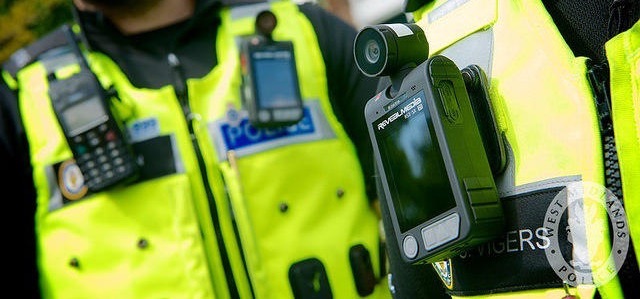Today the Massachusetts’ legislature’s Joint Committee on Public Safety and Homeland Security will hold a hearing on S.1257 / H.2170, “An Act promoting the use of body-worn cameras by law enforcement”. A big thanks to Alex Marthews of Digital Fourth/Restore the Fourth, Jaimie McFarlin and others of the Harvard Black Law Students and everyone else who worked on this police body cameras bill.
Below is our statement in support of these two bills. Thank you to Quartermaster Steve Revilak for drafting our statement.
The Massachusetts Pirate Party is a political designation in Massachusetts. We pride ourselves on being advocates for transparency and open government; today, we are offering testimony in support of H.2170/S.1257: An Act promoting the use of body-worn cameras by law enforcement.
In August of 2015, the U.S. Customs and Border Protection Agency published a report titled “Body-Worn Camera Feasibility Study Report”[1]. This report was the result of a year-long study from CBP’s Body-Worn Camera Working Group. The CBP report lists a number of likely benefits from the use of body-worn cameras, and a number of policy-related issues.
The benefits CBP saw include:
- the evidentiary value of camera footage,
- a reduction in public complaints and lawsuits filed against CBP, and
- improved transparency through the proactive release of video footage.
These are all good reasons for body camera deployment. Video footage provides evidentiary value for law enforcement; it also provides a level of transparency that can be used to build trust between law enforcement and the public.
The policy issues involving body worn cameras are numerous:
- what should (and what should not) be recorded,
- what are the guidelines for data retention, redaction, and segregation of footage,
- what is the impact to individual privacy, and how should privacy issues be resolved, and
- what metrics can be used to judge the effectiveness of a body worn camera program.
We are pleased to see that S.1257 addresses many of these issues, and provides a framework for developing and evaluating policies.
We hope that the legislature considers broadening section 3(c)(2) (“This exception does not apply to individuals filmed in a police interaction, and their legal representatives shall have the right to inspect and copy such recordings”). We agree that an individual should be able to inspect and copy recordings in which they are the subject, and that an individual’s legal representatives should also be afforded such rights. We would urge the legislature to extend this right to (a) the immediate family members of individuals filmed in police interactions, and (b) their survivors or next of kin.
In conclusion, we believe that H.2170/S.1257 is a step forward for transparency, accountability, and public safety, and we urge the legislature to support it.
[1] https://www.cbp.gov/sites/default/files/documents/body-worn-camera-20151112.pdf


Today the Massachusetts’ legislature’s Joint Committee on Public Safety and Homeland Security will hold a hearing on S.1257 / H.2170, “An Act promoting the use of body-worn cameras by law enforcement”. A big thanks to Alex Marthews of Digital Fourth/Restore the Fourth, Jaimie McFarlin and others of the Harvard Black Law Students and everyone else who worked on this police body cameras bill.
Below is our statement in support of these two bills. Thank you to Quartermaster Steve Revilak for drafting our statement.
The Massachusetts Pirate Party is a political designation in Massachusetts. We pride ourselves on being advocates for transparency and open government; today, we are offering testimony in support of H.2170/S.1257: An Act promoting the use of body-worn cameras by law enforcement.
In August of 2015, the U.S. Customs and Border Protection Agency published a report titled “Body-Worn Camera Feasibility Study Report”[1]. This report was the result of a year-long study from CBP’s Body-Worn Camera Working Group. The CBP report lists a number of likely benefits from the use of body-worn cameras, and a number of policy-related issues.
The benefits CBP saw include:
These are all good reasons for body camera deployment. Video footage provides evidentiary value for law enforcement; it also provides a level of transparency that can be used to build trust between law enforcement and the public.
The policy issues involving body worn cameras are numerous:
We are pleased to see that S.1257 addresses many of these issues, and provides a framework for developing and evaluating policies.
We hope that the legislature considers broadening section 3(c)(2) (“This exception does not apply to individuals filmed in a police interaction, and their legal representatives shall have the right to inspect and copy such recordings”). We agree that an individual should be able to inspect and copy recordings in which they are the subject, and that an individual’s legal representatives should also be afforded such rights. We would urge the legislature to extend this right to (a) the immediate family members of individuals filmed in police interactions, and (b) their survivors or next of kin.
In conclusion, we believe that H.2170/S.1257 is a step forward for transparency, accountability, and public safety, and we urge the legislature to support it.
[1] https://www.cbp.gov/sites/default/files/documents/body-worn-camera-20151112.pdf